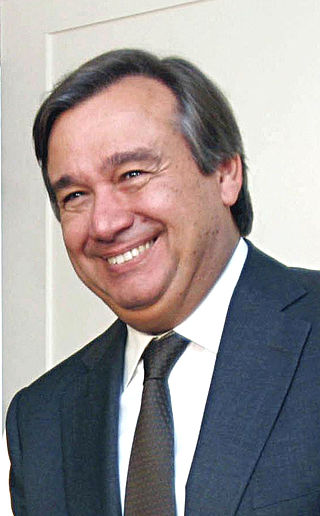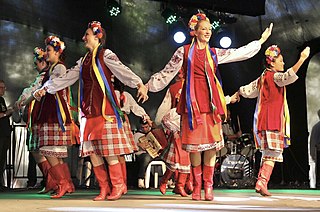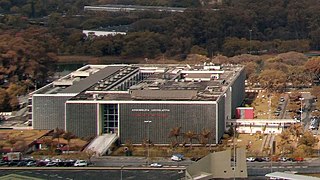
The 1999 Portuguese legislative election took place on 10 October. The election renewed all 230 members of the Assembly of the Republic.

The 1995 Portuguese legislative election took place on 1 October. The election renewed all 230 members of the Assembly of the Republic.

The 1991 Portuguese legislative election took place on 6 October. The election renewed all 230 members of the Assembly of the Republic. There was a reduction of 20 seats compared with previous elections, due to the 1989 Constitutional revision.

Czech Brazilians refer to Brazilians of Czech descent who were born in or who trace their ancestry to the territory of the historic Czech lands or succession states, now known as the Czech Republic, and are residents and/or citizens of Brazil.

The Legislative Assembly of the State of São Paulo is the unicameral legislative branch of São Paulo state in Brazil. The building where the legislative assembly is located, right by the main park of the city also houses one of six Poupatempo units in the city.

The Legislative Assembly of Pernambuco is the unicameral legislature of the state of Pernambuco, Brazil. It has 49 state deputies elected by proportional representation. The most recent election was in 2018, with the Brazilian Socialist Party leading the coalition government.

The Legislative Assembly of Minas Gerais is the state legislature of Brazil's Minas Gerais state. It consists of 77 state deputies elected by proportional representation and is based in Belo Horizonte, the state capital. The Assembly has been based at the Palácio da Inconfidência since the building's 1972 opening; it was made a national heritage site in 2009.

The Legislative Assembly of Rio Grande do Sul is the unicameral legislature of Rio Grande do Sul state in Brazil. It has 55 state deputies elected by proportional representation.
The Guariba-Roosevelt Extractive Reserve is an extractive reserve in the state of Mato Grosso, Brazil. A small traditional population live through fishing, hunting, small-scale agriculture and sale of forest products such as nuts. The reserve is under intense pressure from illegal logging and land grabbing.
The 2019 President of the Federal Senate of Brazil election took place on 2 February 2019, originally one day before, following the opening day of the 56th Legislature of the National Congress, almost four months after the 2018 elections.
The Legislative Assembly of Mato Grosso is the unicameral legislature of Mato Grosso state in Brazil. It has 24 state deputies elected by proportional representation.
The 2021 President of the Federal Senate of Brazil election took place on 1 February 2021, during the opening day of the 3rd Session of the 56th Legislature of the National Congress.

The governor of Rio Grande do Sul is the head of government of the state's executive branch, assisted by his secretaries, whom he freely chooses. Elected by absolute majority in universal suffrage, together with the vice-governor, his term lasts four years; since 1997, reelection has been possible, and although all have sought it, none has succeeded. The current governor is Eduardo Leite, since January 1, 2023.

Renan Barbosa Contar is a former Brazilian military and politician, currently a member of the Legislative Assembly of Mato Grosso do Sul, He ran in the 2022 Mato Grosso do Sul state election as a candidate for governor, but was defeated by Eduardo Riedel (PSDB) on the second round. He attended the Preparatory School of Cadets for the Army in 2002 in Campinas, Brazil. He graduated from the Academia Militar das Agulhas Negras in 2006 in Resende.

José Carlos Barbosa, professionally known as Barbosinha, is a Brazilian politician affiliated with the Progressistas and current Deputy Governor of Mato Grosso do Sul since January 1, 2023.

The government of Mato Grosso do Sul is led by the Governor of Mato Grosso do Sul, Brazil, and is elected by the local population through popular suffrage and direct secret ballot for a four-year term. The current governor is Eduardo Riedel. Its seat is the governorate of Mato Grosso do Sul, which has been the seat of the government of Mato Grosso do Sul since 1983.

The Vice Governor of Mato Grosso do Sul is the second-highest position in the executive branch of the government of Mato Grosso do Sul, after the Governor of Mato Grosso do Sul, and ranks first in the state's governmental succession.
Londres Machado is a politician from Mato Grosso do Sul. He holds the Brazilian record for consecutive election victories, with successive terms starting in 1971. He served as state deputy and twice acting governor of Mato Grosso do Sul.

Paulo José Araújo Corrêa is a Brazilian politician, affiliated with the Brazilian Social Democratic Party, president of the Legislative Assembly of Mato Grosso do Sul since February 2019, serving his sixth term as State Deputy for the state.
Eduardo Rocha is a Brazilian politician who serves as Secretary of the Civil House of Mato Grosso do Sul, in the government of Eduardo Riedel, as well as a state deputy for Mato Grosso do Sul since 2011, he is married to Simone Tebet, a minister in the Government Lula da Silva.












